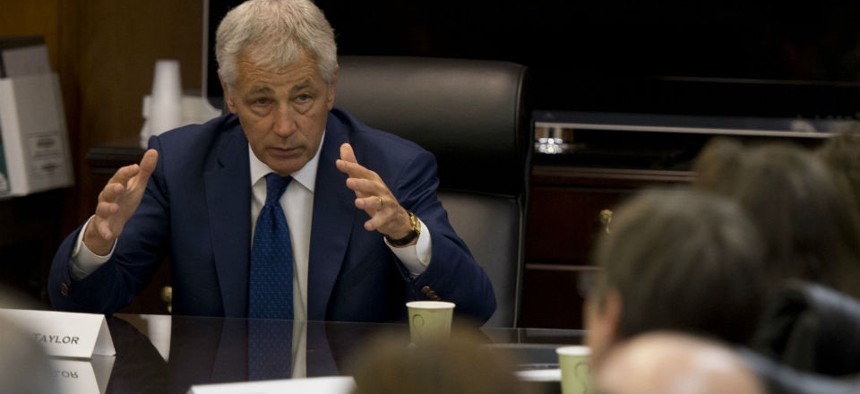
Defense Secretary Chuck Hagel meets with members of the Sexual Assault Response Systems Panel in 2013. Erin A. Kirk-Cuomo/Defense Department file photo
Reports of Military Sexual Assault Increased Over Past Year
But Pentagon leaders said the uptick reflects soldiers feeling more comfortable reporting.
The Pentagon unveiled four new initiatives Thursday to help combat military sexual assault, which saw an 8 percent increase in reporting over the past year.
"The Department of Defense has been taking aggressive action over the past year and a half to stop sexual assault," Defense Secretary Chuck Hagel said during a press conference. "... We believe that our efforts to prevent sexual assault are beginning to have an impact."
There were more than 5,983 reports of military sexual assault during the 2014 fiscal year, compared with 5,518 in the 2013 fiscal year, according to a report to President Obama also released Thursday.
Overall, the number of cases of unwanted sexual contact, which can include sexual assault, decreased to approximately 19,000 in 2014 from 26,000 in 2012.
While Hagel said that the uptick in reporting is "good news," he added that "these crimes however are still heavily underreported."
The department believes the increase reflects that more victims felt comfortable coming forward, according to the report, not that more crimes were committed. The Pentagon estimates that approximately one in four sexual-assault victims filed a report over the past year, compared with one in 10 in 2012.
Moving forward, Hagel said the department will work to customize sexual-assault-prevention methods based on location to help identify possible community risk factors for assault; implement new training for supervisors; and require commanders to assess, and take corrective action on, all reports of retaliation.
The Pentagon will also share the department's sexual-assault reports with all soldiers, which the department said it hopes will lead to more reporting of incidents.
But retaliation remains a problem for the military. More than 60 percent of those who reported sexual assault or unwanted sexual contact said they experienced some form of retaliation, including social and professional retaliation, according to the report.
Last year, Obama said the department had a year to complete the report and crack down on sexual assault, suggesting that more reforms might be necessary if he didn't see results.
While the department acknowledged that more work remains to be done, it also pointed to areas of improvement, including increased training in sexual-assault prevention and streamlining how to respond to reports of sexual assault across the military.
The Pentagon's report comes as a bipartisan group of senators, led by Sen. Kirsten Gillibrand of New York, is pushing to remove a commander's ability to decide which cases are prosecuted. They hope to attach the proposal as an amendment to the National Defense Authorization Act, which the Senate is expected to vote on next week.
"It should be a screaming red flag to everyone when 62 percent of those who say they reported a crime were retaliated against—nearly two-thirds—the exact same number as last year," Gillibrand said in a statement before the press conference. She added "There is no other mission in the world for our military where this much failure would be allowed."
Gillibrand faces one very large obstacle, though: The NDAA likely won't be open to amendments.
Others were more hopeful about the report, with Sen. Claire McCaskill calling the findings "mostly good news" at a press conference Thursday afternoon after the report was released.
Sen. Carl Levin, the outgoing chairman of the Senate Armed Services Committee, called the report "hard evidence that we're making progress."
Both senators opposed Gillibrand's legislation earlier this year.
And across the Hill, Reps. Mike Turner and Niki Tsongas, who cochair the Military Sexual Assault Prevention Caucus, said the "rise in reporting is a possible signal that legislative and military changes from recent years are having an encouraging impact."
But the president of Protect Our Defenders, a victims-advocacy group, came out in opposition to the report. Don Christensen, the former chief prosecutor for the Air Force, said in a statement that the "Pentagon has misled President Obama and the American public with cherry-picked information from its new sexual-assault survey."







